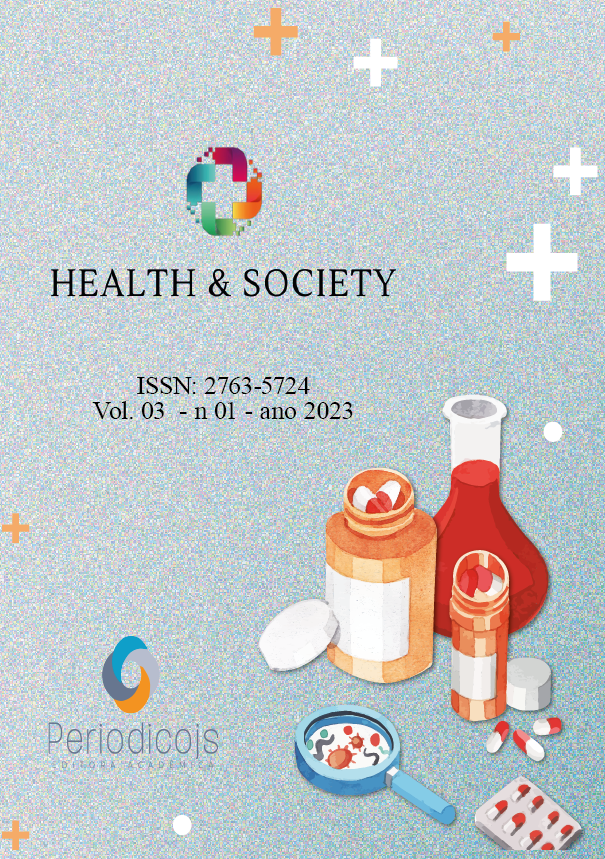Abstract
Alzheimer’s Disease (AD) has different stages and different levels of mental and physical health impairment, which do not cause hospitalization. Thus, we present a manual of procedures for care at the patient’s home, where the caregiver’s role is very important. Physiotherapeutic intervention in patients with AD, linked to Medicine, should take place in a preventive way to the deficiencies that occur due to the lack of physical activities that progressively deteriorate the functional capacity; physiotherapy is indicated in the case of patients with AD, because early treatment has the preventive nature of complications and minimization of symptoms that accompany the pathology in people of advanced age. The general objective is to evaluate and analyze the perspectives in the medical treatment of AD, aiming at its quality of life.
References
ASO, Ester; FERRER, Isidre. Cannabinoids for treatment of Alzheimer’s disease: moving toward the clinic. Frontiers in Pharmacology, v. 5, 2014. Disponível em: <http://journal.frontiersin.org/article/10.3389/fphar.2014.00037/abstract>. Acesso em: 13 Out. 2022.
BENITO, Cristina; NÚÑEZ, Estefanía; PAZOS, María Ruth; et al. The Endocannabinoid System and Alzheimer’s Disease. Molecular Neurobiology, v. 36, n. 1, p. 75-81, 2007.
BERGAMASCHI, M. M.; QUEIROZ, R. H. C.; CHAGAS, M. H. N; OLIVEIRA, D. C. G. de. Cannabidiol reduces the anxiety induced by simulated public speaking in treatment-naïve social phobia patients. Neuropsychopharmacology 36 (6), 1219-1226. 2011.
CAO, Chuanhai; LI, Yaqiong; LIU, Hui; et al. The Potential Therapeutic Effects of THC on Alzheimer’s Disease. Journal of Alzheimer’s Disease, v. 42, n. 3, p. 973-984, 2014.
CILIO, Maria Roberta; SULLIVAN, Joseph. UC San Francisco-Led Study First to Gather Data on Safety and Tolerability of Non-Psychotropic Component of Cannabis for Children. Fevereiro de 2014.
CUNHA, J. M.; CARLINI, E. A.; PEREIRA, A. E.; RAMOS, O. L.; PIMENTEL, G.; GAGLIARDI, R.; SANVITO, E. L.; LANDER, N.; MECHOULAM, R. Chronic administration of cannabidiol to healthy volunteers and epileptic patients. Pharmacology. 1980;21(3):175-85.
GILL, G. N; KOKOO; Mandell; OCKNER, R.K; SMITH, T.W. Cecil: Tratado de Medicina Interna. 20. ed. Rio de Janeiro: Guanabara Koogan, 1997. (Vol. 2).
GORZONI, Milton Luiz; PIRES, Sueli Luciano. Aspectos clínicos da demência senil em instituições asilares. Rev. psiquiatr. clín. 2006, vol.33, n.1, p. 18-23.
KARL, T.; GARNER, B.; CHENG, D. The therapeutic potential of the phytocannabinoid cannabidiol for Alzheimer’s disease. Behav Pharmacol. 2017 Apr;28(2 and 3-Spec Issue):142-160. Doi: 10.1097/FBP.0000000000000247. PMID: 27471947.
ROLAK, Loren: Segredo em neurologia. Jacques Vissoky. Porto Alegre: Artes Médica Sul Ltda.1995. 512p. (228-234).
ROWLAND, Lewis. Merritt: Tratado de neurologia. 9. ed. Rio de Janeiro: Guanabara Koogan, 1997. 805p.
ZUARDI, Antonio Waldo. Cannabidiol: from an inactive cannabinoid to a drug with wide spectrum of action. Rev. Bras. Psiquiatr. [online]. 2008, vol.30, n.3 [cited 2014-05-18], pp. 271-280.

This work is licensed under a Creative Commons Attribution 4.0 International License.
Copyright (c) 2023 Janailton Carlos Leopoldo Pinheiro Muniz





